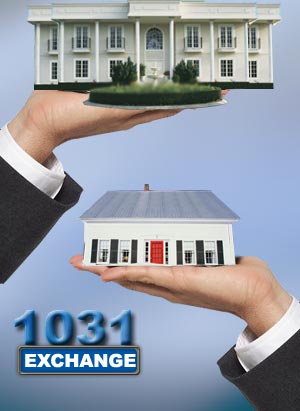
What Every Commercial Real Estate Investor Should Know!
1031 Exchanges are a mechanism for the real estate investor to sell and buy investment property, while deferring taxes and maximizing available equity. There are three types; 1031 Exchange, Reverse Exchange and Improvement Exchange.
An investor who is “trading up” may find this a useful tool. Instead of two transactions, selling Property A, paying the dreaded capital gains tax, and then later purchasing Property B with the proceeds, a 1031 Exchange is considered one transaction, exchanging Property A for Property B. As such, federal and state taxes may be deferred, possibly indefinitely, allowing the investor to use the full amount of equity in subsequent transactions. In order to accomplish this, Section 1031 of the IRS Code requires that three main criteria be met.
First, both properties must be used, “in a trade or business or for investment” and must be of “like kind”. Simply put, most real estate may be viewed as “like kind”. For example, a warehouse may be exchanged for an office complex, or several single rental units may be exchanged for a larger multi-family complex. Even certain kinds of personal property may qualify, such as farm equipment.
Second, a qualified intermediary must be used to facilitate the exchange. In essence, the contractual rights in both transactions are assigned to the intermediary, who receives the proceeds from the sale of Property A, holding them until needed for the closing for Property B. As the investor never actually receives the proceeds from the sale, no taxes are due.
Third, strict time restrictions apply. In brief, any replacement property must be identified within 45 days, and actually closed within either 180 days of the sale of Property A, or the investor’s due date for filing a federal tax return, whichever occurs earlier.
Reverse exchange
 An investor who wants to purchase Property B before the sale of Property A would use this form of exchange. As above, an intermediary would be involved, this time taking and holding title to Property B, rather than holding any proceeds.
An investor who wants to purchase Property B before the sale of Property A would use this form of exchange. As above, an intermediary would be involved, this time taking and holding title to Property B, rather than holding any proceeds.Improvement Exchange
An investor who wants to buy and improve Property B during the 180 day interim period would use this form of exchange. As above, the intermediary would hold title during the exchange period, but allow the investor to manage the improvements.
The savvy real estate investor who wishes to build equity would be well advised to use this form of tax saving mechanism. But please note, this article is only a brief overview of the many advantages a 1031 Exchange may provide. To find out how this device may help you, we recommend that you consult your real estate professional, attorney, CPA or qualified intermediary for more detailed information.

Comments(2)